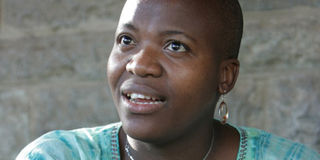Writivism Literary Festival turns four despite early doubts

Zukiswa Wanner is a South African journalist and novelist currently living in Nairobi. Photo/FILE
What you need to know:
- The work in the first anthology was below average. There was very little money and so we were put up in a motel which was so bad its hygiene standards were questionable.
- Bwesigye paid for most of the expenses from his junior lecturer wages. And we all know how little that is, on a continent that hates teachers.
- His determination against all these odds sparked something in me.
Four years ago while accompanying my partner to judge a film festival in Kampala, I received a message on Facebook from a law lecturer at Makerere University. He had seen that I was in Kampala, could he meet up with me at the National Theatre to run something by me? As I had times where I needed to be out of the spouse’s hair so he could deliberate on the films with his fellow judges, we met.
The person I met was this fresh-faced young man named Bwesigye, who talked passionately about starting a literary festival in Uganda. Literary festivals were a dime and a dozen on the continent and in the world, I said to him. What would he do differently?
I wanted to know. He laid out his idea. The literary festival would be what happened at the end of each year but the plan was to get established writers to have an annual literary competition where those with writerly ambitions would enter a short story
contest, take part in a workshop and get editorial feedback from an established writer . I had my reservations but despite them, I agreed to conduct the first literary workshop in Kampala in January 2013 together with Beatrice Lamwaka and Okwiri Oduor
while taking time off from facilitating a FEMRITE workshop one weekend.
Some months later, I would get on a bus with my family and attend the first Writivism Literary Festival. The work in the first anthology was below average. There was very little money and so we were put up in a motel which was so bad its hygiene standards were questionable.
Bwesigye paid for most of the expenses from his junior lecturer wages. And we all know how little that is, on a continent that hates teachers. His determination against all these odds sparked something in me.
I wanted to see this idea succeed. I was not the only one. There has been so much amazing goodwill from African writers staying on and off the continent to take part in the festival as workshop facilitators, mentors and judges, all for no pay.
African governments could learn a lot about what sovereignty means from the writers who have rolled up their sleeves to be writivists.
Four years later, there has been the addition of writers from Francophone Africa to the competition and program to give it a more pan-African outlook.
There are conversations of having Lusophone and Maghreb writers added so, all things remaining constant, it can only get better from here.
For the first time too, writers have taken time out for a large part of the festival, to talk to students at schools in Kampala. It has not really been that much of a revelation to find out that many youngsters believe that nothing has been written since the African Writers Series so it was delightful to find youngsters discovering new writers.
In many ways, this has been the best Writivism Literary Festival in history. This is not to say that there have been no hitches, some of them bordering on diplomatic mess-ups, communication being a major one.
For instance, the Board decided immediately after last year’s festival that not only would the next festival be done in one venue but that it would happen shortly after tertiary institutions opened in August.
Unfortunately, this was communicated to the public late and resulted in Kampala having two literary festivals – the Babishai and Writivism at the same time. This was particularly sad given that Babishai founder Beverley Nambwozo’s previous staunch support for Writivism. Fortunately, this clash of dates will not happen again.
Communication still needs to be improved with guests. Promising to arrange certain things for guests as happened with Maimouna Jallow’s performance of Lola Shoneyin’s The Secret Lives of Baba Segi’s Wives or promising guests two meals daily and then reneging on one of them, particularly when people are not being paid, makes for uncomfortable situations.
Finally, communications with the Kampala audience still needs to be improved. Despite the fact that more people knew of the existence of Writivism than before, there is still need for a greater audience.
That said, one is still impressed by the dedication of many of the volunteers some who, like young writer Jennifer Chinenye, flew all the way from Lagos to be part of the festival. We hope for even better in 2017 as we look forward to the anthology, now currently being edited, in both English and French.
Congratulations, too, to Kenyan poet Redscar K’Oyuga who won the inaugural Okot P’Bitek Prize for Poetry in Translation, and the Short Story winner, Ugandan Immaculate Innocent Acan.
Word is that Oyuga was also the winner in this same weekend, of the inaugural Nyanza Literary Festival poetry section and second runner-up at the Babishai Literary Festival. Clearly someone to be on the look out for on the African literary scene.
Zukiswa Wanner is a South African author based in Kenya. [email protected]





